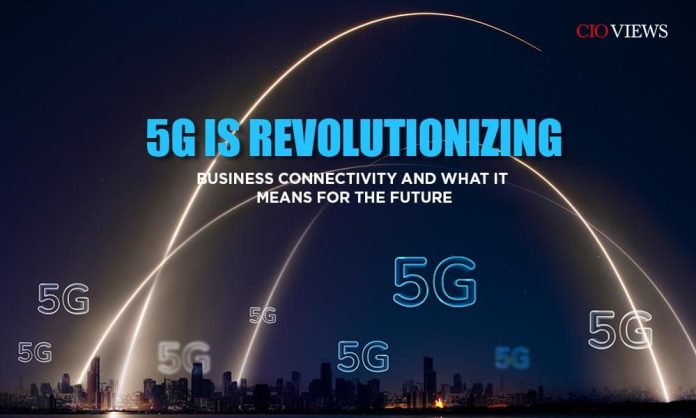The introduction of 5G technology communication a new era in business connectivity. Compared to previous generations of mobile networks, 5G provides unprecedented speed, reliability, and capacity, allowing businesses to operate more efficiently and innovate faster. As industries increasingly digitize and integrate more connected devices, 5G grows as an essential tool for the future of enterprise operations.
Businesses are leveraging 5G to unlock new possibilities, from enhancing remote work to revolutionizing smart manufacturing. Understanding how 5G is set to transform business connectivity is essential for any enterprise looking to stay ahead in the rapidly evolving digital landscape.
The Impact of 5G on Business Connectivity
Faster Data Transmission Speeds
One of the most significant advantages of 5G is its ability to transmit data at lightning-fast speeds. Businesses can experience download and upload speeds up to 100 times faster than 4G, reducing the time it takes to complete data-intensive tasks. This speed enables businesses to operate more efficiently, particularly in industries that rely heavily on large data transfers, such as media, finance, and healthcare.
Faster data transmission also means that cloud-based applications can perform better, providing employees with instant access to critical information and tools. This capability is particularly beneficial for remote work environments, where seamless access to resources is crucial for productivity.
Lower Latency and Real-Time Communication
Latency, the delay before a transfer of data begins following an instruction, is drastically reduced with 5G. This reduction allows for near-instantaneous communication between devices, which is essential for applications that require real-time data, such as autonomous vehicles, remote surgery, and live video streaming.
For businesses, lower latency translates to more responsive communication systems and the ability to implement real-time analytics. Industries like logistics and manufacturing can benefit immensely from this, as it allows for more precise control over processes and quicker decision-making.
Reliability and Network Slicing
5G also improves reliability, allowing for consistent performance even in high-demand environments. One of the key features of 5G is network slicing, which allows businesses to create virtual networks that are tailored to their specific requirements. This feature ensures that critical applications have adequate bandwidth and latency, even during peak usage periods.
For businesses, network slicing can mean the difference between smooth operations and costly downtime. It also enables the prioritization of different types of traffic, ensuring that essential services remain uninterrupted. This reliability is crucial for industries that depend on continuous connectivity, such as healthcare and finance.
5G and the Future of Industry
5G and the Internet of Things (IoT)
5G is poised to accelerate the growth of the Internet of Things (IoT) by providing the necessary infrastructure for billions of connected devices to communicate seamlessly. The low latency and high capacity of 5G make it possible for IoT devices to operate in real-time, enabling smarter cities, automated factories, and more efficient supply chains.
Businesses that invest in IoT technology can leverage 5G to gain deeper insights into their operations, optimize processes, and reduce costs. The integration of IoT with 5G can lead to the development of new products and services that were previously unimaginable, driving innovation across industries.
Enabling Remote Work and Virtual Collaboration
The COVID-19 pandemic accelerated the shift to remote work, and 5G is set to further enhance this trend by providing the bandwidth and reliability needed for seamless virtual collaboration. With 5G, businesses can offer their employees faster and more secure connections, whether they’re working from home or on the go.
The increased capacity of 5G networks also supports more robust video conferencing, virtual reality (VR) meetings, and real-time collaboration on large projects. This capability allows businesses to maintain productivity and teamwork regardless of physical location, making remote work a viable long-term option.
Impact on Industry 4.0 and Smart Manufacturing
Industry 4.0, characterized by the integration of digital technologies into manufacturing, is heavily dependent on reliable and fast communication networks. 5G provides the backbone for smart factories, where machines, sensors, and robots can communicate and coordinate in real-time. This level of connectivity enables greater automation, predictive maintenance, and more efficient production processes.
For manufacturers, 5G means increased operational efficiency, reduced downtime, and the ability to quickly adapt to changing market demands. It also opens up new possibilities for innovation, such as the use of augmented reality (AR) for training and remote support.
Challenges and Considerations for Businesses Adopting 5G
Infrastructure and Deployment Costs
While the benefits of 5G are clear, the cost of deploying the necessary infrastructure can be a significant barrier for businesses. Implementing 5G requires substantial investments in new hardware, software, and network architecture. For small to medium-sized enterprises (SMEs), these costs can be particularly challenging to manage.
Businesses must carefully assess the return on investment (ROI) of 5G adoption and consider phased implementation strategies. Partnering with telecommunications providers and exploring government incentives can also help offset some of the costs associated with 5G deployment.
Security and Data Privacy Concerns
As businesses adopt 5G, they must also address the heightened security risks that come with increased connectivity. The vast number of connected devices in a 5G network creates more potential entry points for cyberattacks. Additionally, the real-time nature of 5G communication can make it more difficult to detect and mitigate security breaches.
Businesses need to prioritize cybersecurity measures when implementing 5G, including encryption, multi-factor authentication, and regular security audits. Ensuring compliance with data privacy regulations is also critical, particularly in industries that handle sensitive information.
Regulatory and Compliance Issues
The global rollout of 5G is subject to varying regulatory frameworks, which can create challenges for businesses operating in multiple regions. Companies must navigate different compliance requirements related to spectrum allocation, data protection, and cross-border data flows.
Staying informed about the evolving regulatory landscape is essential for businesses to ensure compliance and avoid potential legal issues. Collaborating with legal experts and industry associations can help businesses navigate these complexities and align their 5G strategies with regulatory requirements.
What 5G Means for the Future of Business?
The revolution brought about by 5G is just beginning, and its impact on business connectivity will be profound. As companies embrace 5G, they can look forward to unprecedented levels of efficiency, innovation, and flexibility. However, successful adoption will require careful planning, investment, and a focus on security and compliance.
For businesses that are ready to take the plunge, 5G offers a gateway to the future, where connectivity powers new possibilities and drives the next wave of digital transformation.





